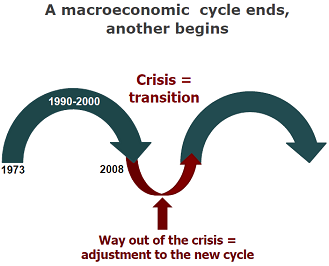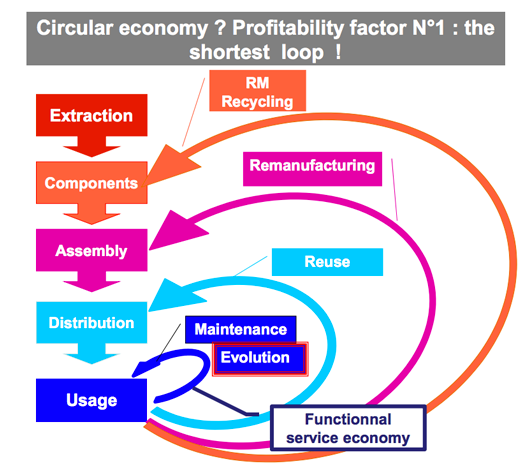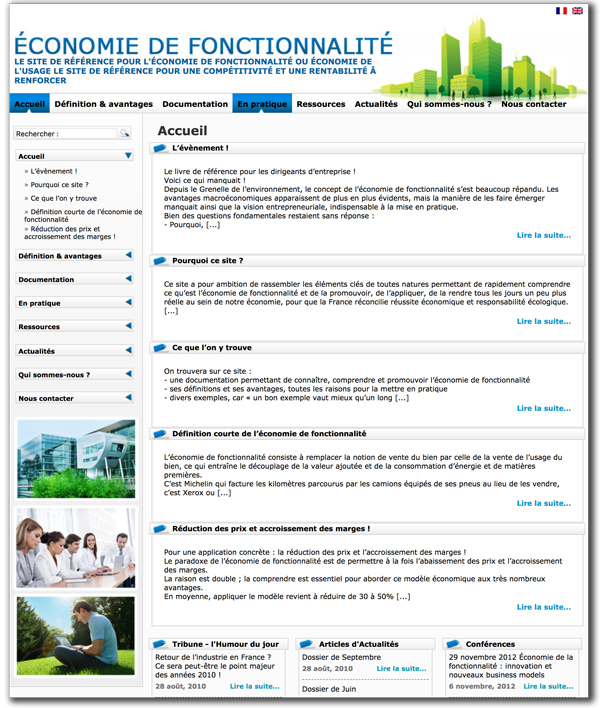Our positioning for a new growth engine for companies and local authorities
(reading time 2 minutes 40s)
The crisis continues, a lot further than promised; companies want to understand and find solutions to their economic and social imperatives, local authorities also, trapped between the rise in unemployment and the decrease of tax revenues. We contribute by providing companies and local authorities with adapted economic models and in their versions most economical and social: circular economics, functional service economics and collaborative economics.

A crisis is nothing other than a transition phase, between an ending macroeconomic cycle and an emerging macroeconomic cycle. This phase can only be managed rapidly and positively (way out from the crisis) if we are conscious of the reasons for which the first cycle has reached its end and the guidelines of the emerging cycle, guideline which must be adapted urgently.
Basically, a cycle ends because it has created, by its own development, the reasons of its ending and/or because a discovery, a technological innovation, has transformed the expectations of the market. The discovery of America and bypassing Africa to India and China provoker a major displacement of the market that was until them intra-Mediterranean towards the Atlantic and towards the Indian Ocean. The international business guidelines became the management of very long boats, far from the coasts.
Basically, a cycle ends because it has created, by its own development, the reasons of its ending and/or because a discovery, a technological innovation, has transformed the expectations of the market. The discovery of America and bypassing Africa to India and China provoker a major displacement of the market that was until them intra-Mediterranean towards the Atlantic and towards the Indian Ocean. The international business guidelines became the management of very long boats, far from the coasts.
The cycle that is ending started with the oil counter-shock in the 80‘s and the relaxing of the exchange controls at the same period. The first enabled to believe, huge mistake, that energy and raw materials would once again be available and at a low cost. Various countries with an abundant and cheap workforce opened up which lead to cost reduction and maximizing margins. The development induced millions of people and the renewal of consumption in the economy in Occidental countries, supported by a demand policy, created a new situation for material resources. Firstly, a near shortage of certain resources, soaring prices on all or nearly all, and secondly a transformation of a strategic material resource as a political weapon more and more frequently like the first oil crisis of 1973 that set the example. To this, is associated a stagnating tendency in emerging countries as always dependent on the orders of developed countries, which, tied down by debt and mass unemployment, may no longer play the initiating role of the 80’s and 90’s.
The 1973-2008 cycle, by first approximation, generated its end by reaching the limit of the availability of material resources. The guidelines of the new cycle require parsimonious consumption of these resources, the search for margins on small volumes and placing a large voljume logic, specific to the previous cycle.
Our knowledge covers the rapid and progressive passage towards this economy parsimonious in material resources. It includes diverse aspects of circular economics of which functional service economics is the shortest route and thus has the most added value.
Our knowledge also covers economics and collaborative innovations of which the main characteristic is to create added value without material resource consumption



